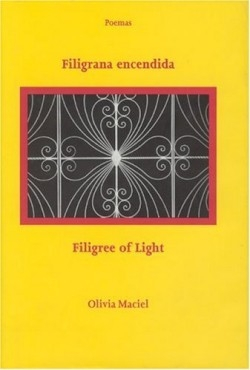Filigrana Encendida (Filigree of Light)
An irrepressible splash of color links the forty-two poems in this new collection, an appreciation of the play of refracted light evident in many of the titles: “The Pomegranate,” “Black Cherries,” “Baroque Pearl,” “The Red of His Sleeve,” “Belated Blackberries,” “Black Snail,” “Golden Ember,” “Red Carnations.” This coruscation of shifting colors indeed creates the image of a delicate filigree cast by a light thrown as though through a prism.
The reader will detect a persistent sense of images captured on the run, where the themes of the various poems refuse to pretend to deep meaning, but celebrate instead the glow of surface, the beauty of the concrete, and the shifting light that shines through words that sometimes appear to have been flung randomly onto the page. One can imagine this lyric imagination having spread all the poems out in a row and run lightly down the line flinging random spatters of color from a series of mischievously dripping brushes, like a translation of a Jackson Pollock painting into words.
The call to sensory response is not limited to the visual. In “Doves and Gardenias,” for example, the poet confesses: “I search beneath words hoping to free doves / so they may fly in flocks, / I search, seeking to lift / the fragrance of gardenias, / I search, eager to savor that velvety / taste of strange / words.”
In many of the poems, there is the suggestion of an unfettered determination to bring into juxtaposition images so various in their origin, so unimaginable in their connections, that they shock the critical sense into silence. From “Wind,” for example: “We shall breathe into the open mouths / of the dead. / Magic words, / wind, wind … / and my secret will twist into the curvaceous / opening of your sea conch. // We shall breathe until the essence of the waves / rises again and the delicate turn of the robin / catches the purple sigh of the orchid.” The mind stumbles in pursuit of such images and arrives at a new surface that might have been painted by Dali. These words refuse to be either parsed or denied. They are what they are. They say what they please. Intrepid? Yes!
The poet, born in Mexico City and currently a lecturer at the University of Chicago, is the author of two previous books of poetry, and has also written articles on the art and culture of Latin America for various publications. The poems in this volume have been sensitively translated into English, and the handsome hardcover book was made possible by a grant from the Illinois Arts Council.
Reviewed by
Sandy McKinney
Disclosure: This article is not an endorsement, but a review. The publisher of this book provided free copies of the book to have their book reviewed by a professional reviewer. No fee was paid by the publisher for this review. Foreword Reviews only recommends books that we love. Foreword Magazine, Inc. is disclosing this in accordance with the Federal Trade Commission’s 16 CFR, Part 255.

